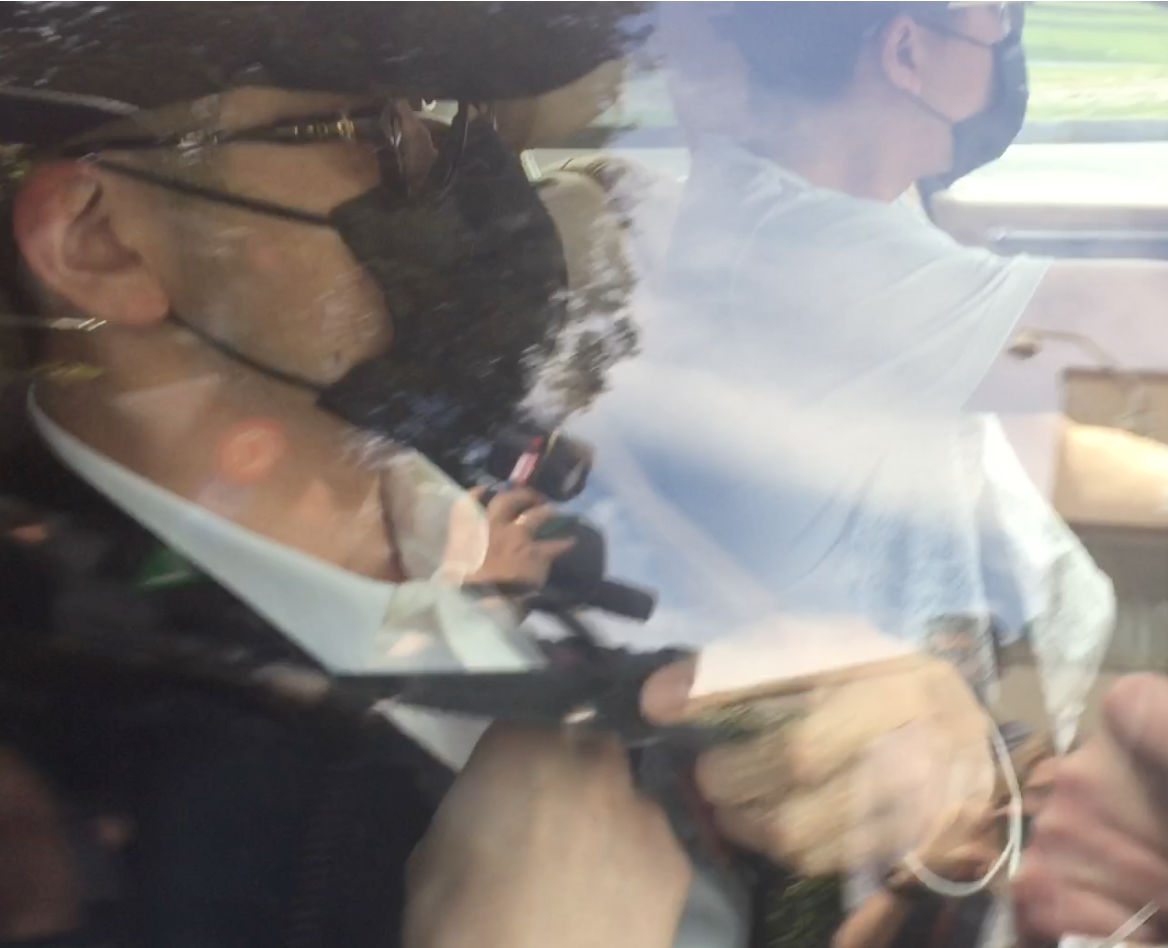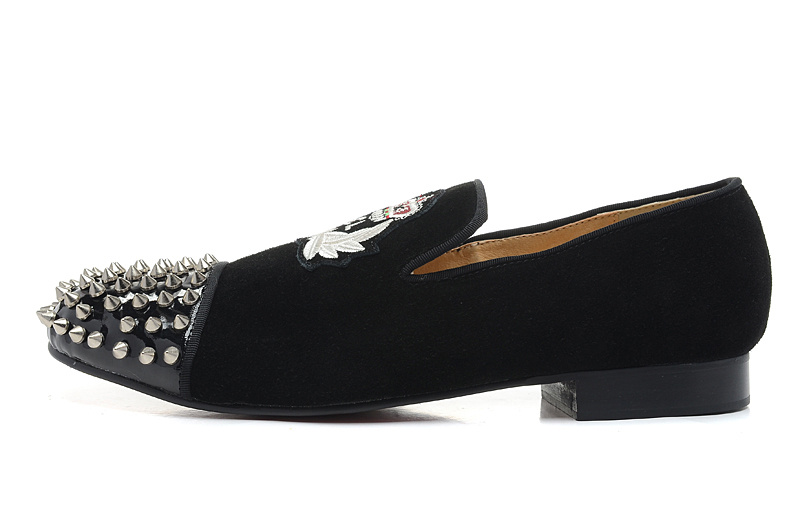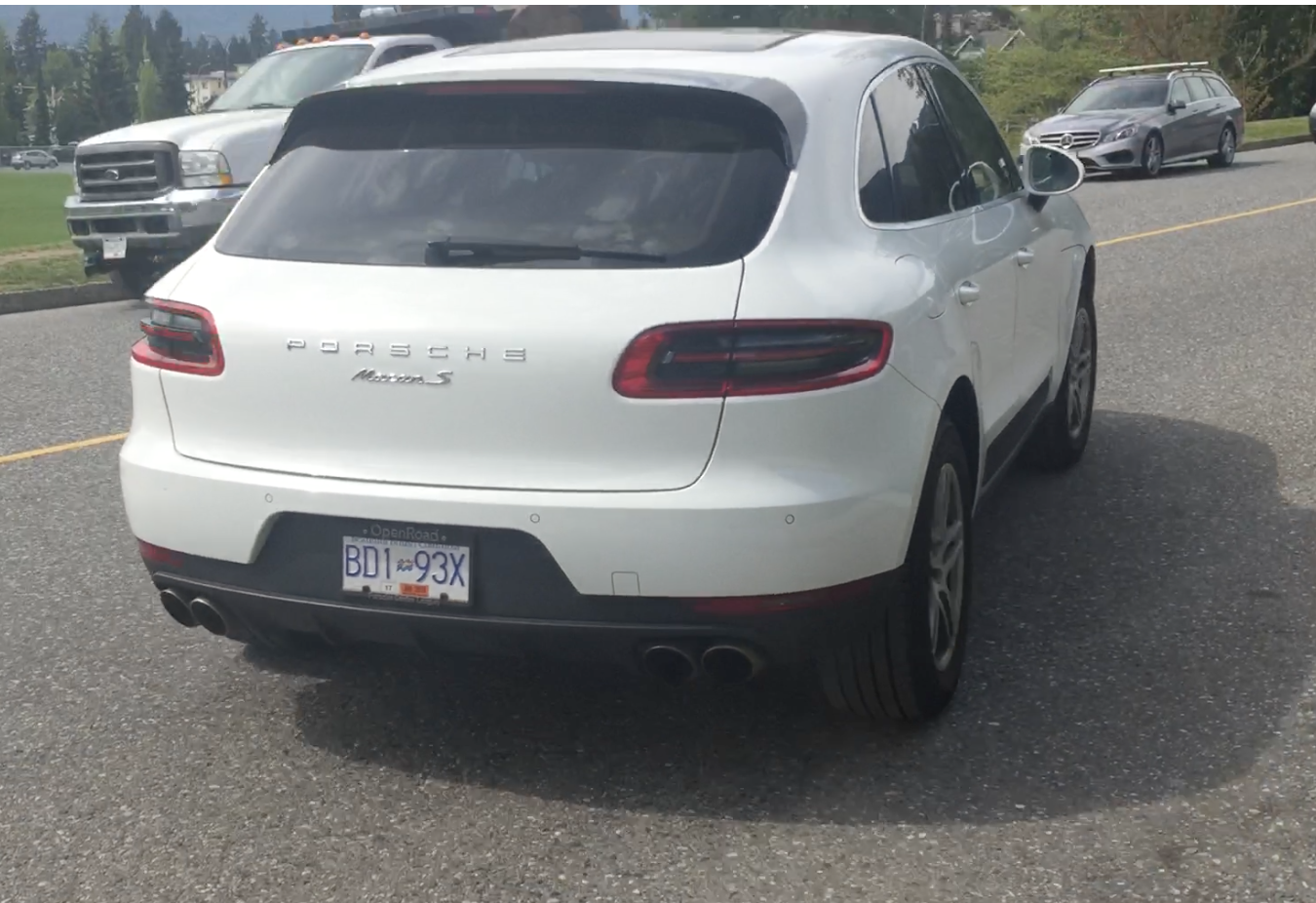
Bob Mackin
When Yihao Wang strode out of the North Vancouver Provincial Courthouse on May 8, the 23-year-old’s black baseball cap, sunglasses and surgical mask disguise captured the attention of reporters and cameramen.

Wang’s Christian Louboutin spiked loafers retail for $1,200.
He had just been fined $750 for driving a $300,000 Ferrari 210 kilometres-an-hour over the Lions Gate Bridge after midnight last July 4. The shoes he was wearing — black flannel Christian Louboutin Harvanna Spikes loafers — retail for more than the penalty that was imposed by Judge Eugene Jamieson.
Just like the Salvatore Ferragamo velvet gold-monogrammed loafers he wore April 24, the day he pleaded guilty and led reporters on a similar bizarre walk along 23rd Street.
“The type of driving that was done in this case seems to be quite reckless, showing a significant disregard for the safety of those using the road,” Jamieson told the court.
“It’s only out of some great luck that nothing worse happened, that no one was hurt or killed by what occurred.”
How fast is 210 km-h? When Ontario’s Paul Tracy took the checkered flag in the last Molson Indy Vancouver in 2004, the average speed on the roads around False Creek was 95.9 miles per hour. That is 154.34 km-h in metric, or 55 km-h less than Wang’s speed.
But, Jamieson conceded, Wang was guilty under the Motor Vehicle Act, rather than the Criminal Code of Canada. Both the Crown and defence agreed on the fine.
“A sentencing judge does not lightly depart from what’s seen as a joint submission between Crown and defence,” Jamieson said.
Wang has no criminal record. His record of driving fines seems to indicate the reward — racing on public streets for fun — outweighs the risk — a traffic fine costing less than the price of a pair of loafers.

Wang disguised his face but showed-off his fancy shoes (Mackin)
He was banned from driving for two months in 2014. He had three prior excessive speed convictions. On the night of the latest incident, there were no drugs or alcohol detected and no other drivers or pedestrians on the bridge. The West Vancouver Police officer that caught him recognized him from a previous stop.
Wang’s lawyer, David Baker, said the 16-month driving ban ordered a week after the incident was longer than the minimum one-year ban for drunk driving. The 2015 Ferrari 458 supercar, he said, has been sold.
In the effort to obtain a light sentence for his client, Baker claimed his client had been “harassed” by media. In Baker’s mind, asking questions about the source of Wang’s wealth and the nature of his parents’ profession qualify as harassment. (Wang lives with his wife and their 22-month old boy in a $6.29 million British Properties mansion that is registered in the name of Xinghui Wang. Fuerdai is a Mandarin term meaning “rich second generation.”)
“This case has nothing to do with money laundering or wealth,” Baker said. “Really, it has to do with a young man who shouldn’t have been driving such a powerful vehicle, it was a mistake to have that vehicle in the first place.”
Wang can breathe a sigh of relief that B.C. doesn’t have fines like Finland, which uses a complicated day-fine system that means the more disposable income a speeding driver has, the bigger the fine for speeding.
Toronto Maple Leaf Leo Komarov was slapped with $51,000 in fines for driving too fast in 2014 in Finland. Komarov, who had inked a $2.95 million a year contract with the Buds, drove 77 km-h in a 50 km-h zone and 131 km-h in a 100 km-h zone.
Baker told Jamieson that his client came to Canada in 2012 from China, has studied post-secondary ecnonomics and mathematics, and started a small business.

Wang was a passenger in a Porsche SUV (Mackin)
Baker did not offer details inside or outside court about the nature or name of Wang’s business or that of his parents.
Near the end of the hearing, Wang stood-up next to Baker, to address the court. He is tall with spiky hair, partially shaved on the sides, and wears swanky-style eyeglasses with black rims. The only words Wang spoke in court, translated to English by a Mandarin interpreter, were “I’m really sorry for what I did in the speeding incident. I promise I will not do that again.”
Attorney General David Eby, who is responsible for auto insurance and driver regulation, is pondering higher penalties and premiums for drivers that cause the most damage and rack-up the most speeding tickets.
There is some science to justify connecting penalties to wealth. Paul Piff, a professor of psychology and social behaviour at University of California Irvine, led a 2012 report for the Proceedings of the National Academy of Sciences called “Higher social class predicts increased unethical behavior.”
Piff’s team found that “upper-class individuals were more likely to break the law while driving, relative to lower-class individuals.” Researchers observed drivers of luxury cars yielded right-of-way less frequently to drivers of cheaper vehicles and they also yielded right-of-way to pedestrians less frequently than did the drivers of cheaper vehicles.
Wang said nothing to reporters as he made his way around the corner of 23rd Street to his friend’s waiting white Porsche SUV on St. Georges. He will be eligible to drive again in November, unless the Superintendent of Motor Vehicles feels like extending the temporary ban.
Until then, Wang is free to move about as he pleases. In shoes worth more than he was fined.
Support theBreaker.news for as low as $2 a month on Patreon. Find out how. Click here.











